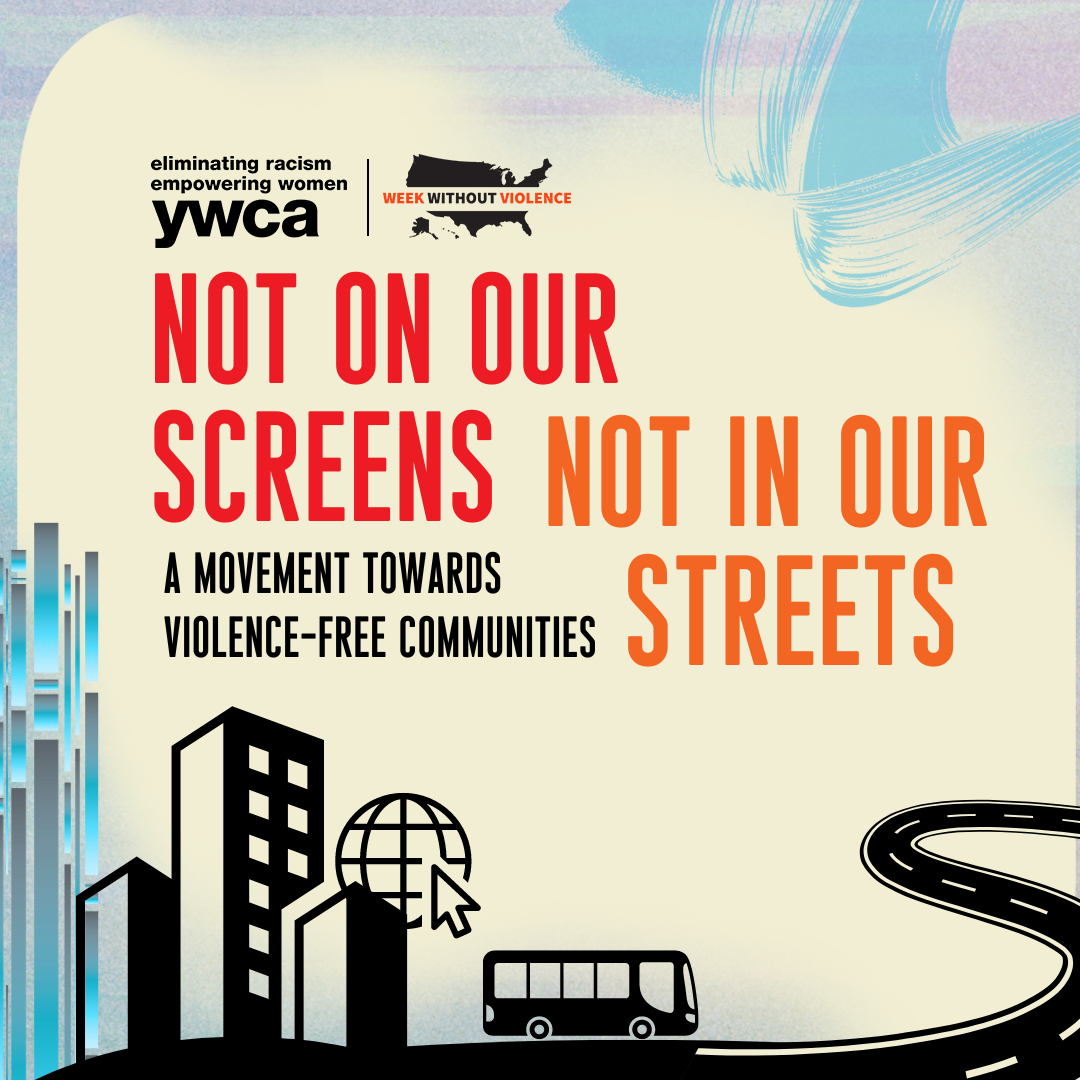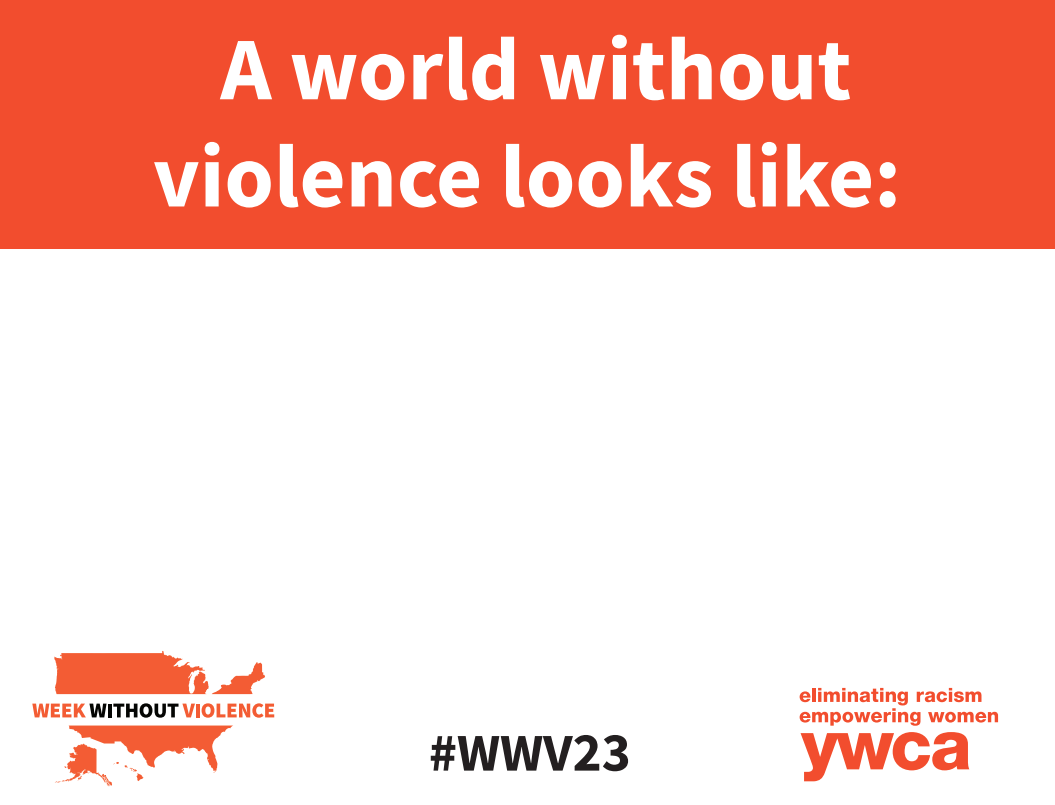
Week Without Violence
YWCA Week Without Violence: October 16-20, 2023
"Week Without Violence is part of a global movement with YWCAs across the country and around the world to end violence against women and girls. At YWCA, we know that not all violence is acknowledged or responded to equally and that some victims go unrecognized altogether. That’s why, for more than 20 years, YWCA has set aside one week in October as a Week Without Violence. Join us from October 16–21, as we raise awareness, elevate survivor voices, talk with policymakers, and more with a common goal: centering survivors so that together, we can end gender-based violence." - YWCA USA
October is Domestic Violence Awareness Month. We join in solidarity with our local community organizations who are on the frontlines of supporting domestic violence survivors and advocating for an end to violence in our society. For more than 20 years, YWCA USA has set aside one week in October as a Week Without Violence. This year, Oct. 16-20 is dedicated to sharing information, stories and awareness of the multifaceted issues surrounding gender-based violence.
Take part in a Week of Action! Check out some Week Without Violence resources and activities for you to educate, engage and empower yourself and your community.
#WWV23 In the News
West Hawaii Today || Hawaii Tribune Herald || The Garden Island
Share your Mana‘o: Send us your sign + selfie
What does a world without violence look like to you?
Why do you think it’s important to end gender-based violence?
Why do you stand with survivors of abuse?
Join our YWCA O‘ahu staff in showing your support for the Week Without Violence. Click to download PDFs of the #WWV signs below, print them out and fill in your messages. Share your photos with us on social media by tagging @ywcaoahu or email us your pics here!
Blog: Resilience and Strength In the Face of Adversity
Originally posted on the YWCA USA Blog on October 22, 2020
By Cara Mazzei, Director of Development and Community Relations, YWCA O‘ahu
At YWCA, we imagine a world without violence. Unfortunately, that is not our current reality. Every 90 seconds a woman in the United States is sexually assaulted, and only half of domestic violence incidents are reported to the police.
Research has shown that violence transcends all boundaries, affecting women across social, economic, cultural, and family backgrounds. Gender-based violence occurs among all races and ethnicities – unfortunately at greater rates for women of color.
Hawaii is the only majority Asian-American, Pacific Islander state in the U.S., and has the highest Pacific Islander and Native Hawaiian population in the country at 27.5% of the state’s population.
Beyond the iconic tourist imagery of aloha shirts and Waikiki beach, the Hawaiian Islands are home to tremendous ethnic, linguistic and cultural diversity. These unique factors can make the work of reporting and addressing gender-based violence more complicated, as there is no “one size fits all” approach. While each island shares elements of being geographically remote with people living in poverty next to people of great wealth, each island has vastly different community needs.
The state of Hawaii has three YWCA associations located on the islands of Kauai, Oahu and Hawaii. I spoke with each of the association CEOs to see how they are working to prevent violence and support survivors in their communities.
In what ways does your association address violence against women?
Noriko Namiki, CEO YWCA Oahu: Women participating in our economic advancement programs come from all walks of life, and a large percentage of them have experienced domestic violence or some form of violence coupled with other traumatic life events, including sexual assaults and incarceration. By the time they come to our programs, these women are ready and wanting to move on with their lives by becoming self-sufficient. Our Dress for Success program helps boost their confidence so that they can believe in themselves again and achieve their life goals, including securing and maintaining employment. They will learn to rely on no one but themselves. Many women who move to our transitional housing facility Fernhurst from the Women’s Community Correctional Center also share similar experiences. Our programs become a critical component of getting them back on their feet and reestablishing their lives after incarceration.
Kathleen McGilvray, CEO YWCA Hawaii Island: Breaking the cycle of violence and addressing childhood trauma, as our programs do, is the beginning of healing as a community. Whether it is through our 24/7 Sex Assault Support Services and recovery program, our Healthy Families Hawaii Island program, or our Developmental Preschool, we have seen that work with families in the early stages of life makes a tremendous difference. We assist individuals and families to heal the pain of sexual assault during a time of unimaginable trauma. We provide crisis counseling and therapy no matter when someone comes to us, as well as immediate forensic evidence collecting.
Renae Hamilton-Cambeilh, CEO YWCA Kauai: On Kauai we are the only providers of 24-hour crisis services for domestic violence and sex assault, and provide the only Family Violence Shelter. We approach our work of ending domestic and sexual violence in three ways: (1) victim/survivor support, (2) treatment for batterers and sex offenders and (3) prevention education. Our comprehensive approach addresses this violence from every angle. We believe that providing clinical treatment for batterers and offenders is crucial to leading violence free lives. Our Prevention Education efforts are meant to inform youth and adults and prevent future abuse from occurring.
At YWCA, we must continue to imagine a world without violence. Whether our communities are big or small, our programs are making a difference. We know that the people we serve are resilient and their lives are not defined only by violence. Our collective hope is that these challenges will be behind them soon.














